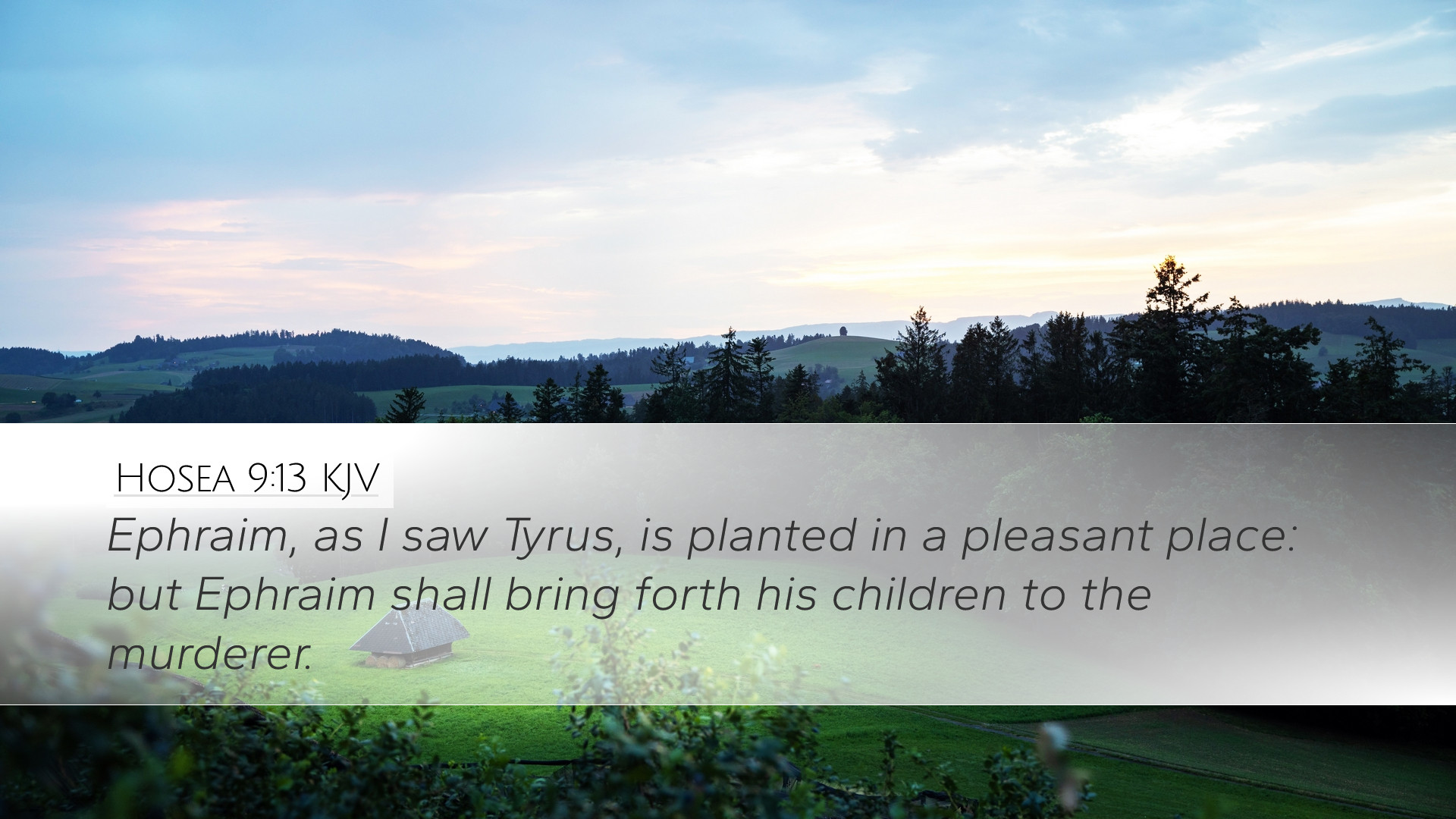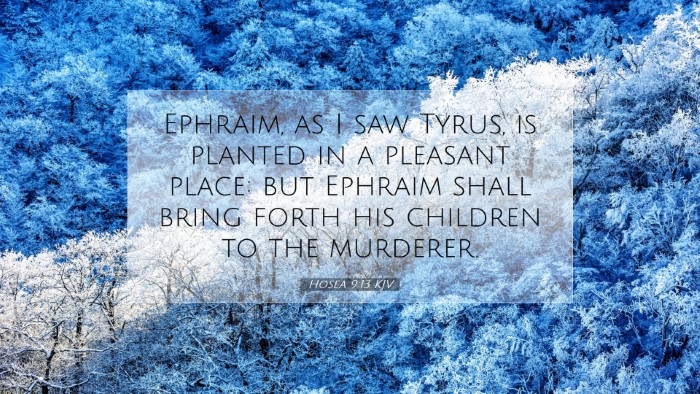Old Testament
Genesis Exodus Leviticus Numbers Deuteronomy Joshua Judges Ruth 1 Samuel 2 Samuel 1 Kings 2 Kings 1 Chronicles 2 Chronicles Ezra Nehemiah Esther Job Psalms Proverbs Ecclesiastes Song of Solomon Isaiah Jeremiah Lamentations Ezekiel Daniel Hosea Joel Amos Obadiah Jonah Micah Nahum Habakkuk Zephaniah Haggai Zechariah MalachiHosea 9:13
Hosea 9:13 KJV
Ephraim, as I saw Tyrus, is planted in a pleasant place: but Ephraim shall bring forth his children to the murderer.
Hosea 9:13 Bible Commentary
Bible Commentary on Hosea 9:13
Introduction
The verse Hosea 9:13 states:
"Ephraim, as I saw Tyrus, is planted in a pleasant place: but Ephraim shall bring forth his children to the murderer."
This verse encapsulates a prophecy concerning the northern kingdom of Israel (Ephraim) and serves as an admonition about its eventual fate due to persistent unfaithfulness towards God. By analyzing insights from prominent public domain commentaries such as those by Matthew Henry, Albert Barnes, and Adam Clarke, we can better understand the depth of this prophecy.
Contextual Analysis
Understanding Hosea 9:13 requires a grasp of its historical and theological context. Hosea prophesied during a time when Israel was marked by moral decay, idolatry, and social injustice. The Kingdom had enjoyed prosperity, represented here by the imagery of Ephraim being "planted in a pleasant place," akin to Tyrus, a prosperous city known for its trade and strength.
Matthew Henry's Insights
Matthew Henry identifies Ephraim as a representation of the whole nation of Israel. He notes that Ephraim's strength and beauty, likened to Tyrus, does not equate to divine favor. Instead, he emphasizes that the Israelites relied on their material wealth and alliances, neglecting their covenant with God.
- Spiritual Judgments: Henry interprets the “children to the murderer” as a forewarning of the impending doom and destruction that the children of Israel would face due to their sins.
- Divine Comparison: He highlights the use of Tyrus as a comparative metaphor to indicate that despite its allure, just like Tyrus that fell, Ephraim would ultimately suffer a similar fate of destruction.
Albert Barnes' Contributions
Albert Barnes expands on the metaphor of being “planted in a pleasant place.” He suggests that this phrase indicates a false sense of security and prosperity. The comfort which Ephraim experienced, much like Tyrus, led to spiritual complacency.
- Succumbing to Idolatry: Barnes notes that Ephraim’s prosperity is perishable and warns that their children, delivered to the murderer, foretell capturing and destruction by hostile forces as a direct consequence of their rebellion against God.
- Destructive Outcomes: He emphasizes the grim reality that without repentance, the beautiful facade of life would lead to their demise, a stark reminder for both contemporary and historical audiences.
Adam Clarke's Perspective
Adam Clarke highlights the significance of the term "children to the murderer," which he interprets in the light of Israel's eventual exile and captivity. Clarke provides an insightful theological reflection on the implications for children being subjected to the consequences of their parents' unfaithfulness.
- Covenantal Responsibility: He underscores a vital truth regarding the generational impact of sin and the collective responsibility of a nation before God, warning pastors and theologians about the effects of societal sin.
- Forewarning of Judgment: Clarke describes the 'murderer' analogy as a portrayal of Assyria and their brutal conquests, revealing the eventual destruction God has ordained against the unfaithful.
Theological Implications
The profound implications of Hosea 9:13 are two-fold—first, they serve as a reminder of the faithfulness required from God’s chosen people, and second, they warn of the merciful yet just nature of God's judgment.
- God's Sovereignty: The commentary from Matthew Henry highlights that God’s allowance of Israel’s downfall does not negate His sovereignty but rather displays His justice in response to Israel’s unrepentant idolatry.
- Social Justice and Responsibility: The understanding that societal decay results from collective sin calls leaders within the Church to assess contemporary issues reflecting the unfaithfulness depicted in Hosea's prophecy.
Application for Today
Pastors, students, and theologians can utilize the insights gathered from this commentary to engage with both historical and contemporary applications. The essence of Hosea 9:13 teaches about the dangers of spiritual complacency.
- Call to Repentance: Like Ephraim, communities today are invited to address their spiritual decay and return to God, recognizing that prosperity without Him is fleeting.
- Awareness of Consequences: The shared consequences of sin provide a powerful lens through which leaders can educate and motivate congregants towards righteousness.
- Hope in Restoration: Finally, the ultimate message of Hosea is not solely one of judgment but also one of hope; that despite failures, God remains ready to restore those who turn to Him.
Conclusion
Hosea 9:13 serves as a powerful reminder of the consequences of straying from God’s path and why vigilance in faith is necessary for individual and communal wellbeing. The insights from Matthew Henry, Albert Barnes, and Adam Clarke provide a rich tapestry of understanding that encourages deeper reflection on one's faith and the collective responsibility towards God.


